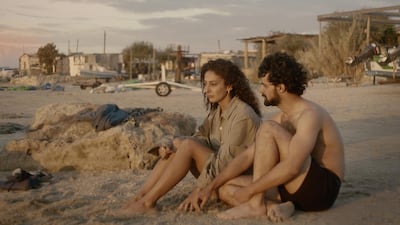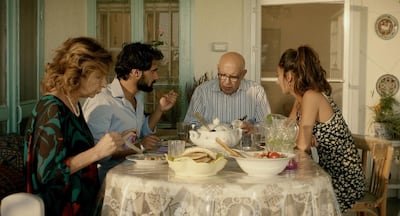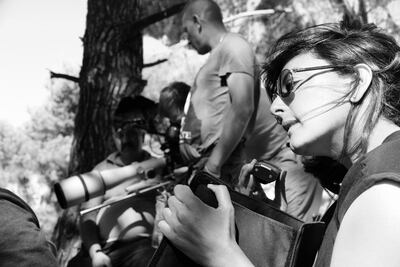The idea for director Najwa Najjar's third narrative feature came to her in a fairly unassuming way. It was December 2016 and Najjar was in Haifa, feeling hungry. The friends she was with had two favourite falafel spots and the decision to pick one place over the other proved instrumental in the creation of Between Heaven and Earth, which had its premiere at the Cairo Film Festival in November last year.
After all, taking pictures of food has become a part of modern life, whether it's sending images to loved ones or posting pictures on social media. So Najjar did the same, snapping some photos of her imminent meal.
"The guy at the falafel spot asked me what I was doing," says Najjar. "I told him that I'm a filmmaker."
His response was not what Najjar expected. "He told me, 'My son is driving me crazy. He has a scholarship to go to Goldsmiths in London, to study film, but he's refusing it. Because he's one of the guardians of Iqrit.' I felt ashamed because I didn't know where Iqrit was."
Iqrit was a Palestinian Christian village in northern Galilee. In November 1948, the Israeli army told the villagers to leave for their own safety. Most of the 490 inhabitants were transferred to a nearby village, believing that they would return to their homes in a week or so. The area was declared a military zone and the villagers were prevented from returning.
They were embroiled in the Nakba when, in the space of three years, 700,000 Palestinian Arabs fled or were expelled from their homes and their lands were confiscated by Israel. The villagers of Iqrit challenged their expulsion in Israel's supreme court, which ruled in July 1951 that the village's evacuation was illegal and those who lived there must be permitted to return.
On Christmas Day that year, Israeli soldiers demolished most of Iqrit, leaving only the church and cemetery standing, and took the land by force.
The villagers fought a legal battle and, in 2003, a final supreme court ruling rejected the people of Iqrit's demand to be allowed to reclaim their homes. The villagers and their descendants were only allowed to hold services in the church and bury their dead in the cemetery.
It was this tragic history that Najjar read about, before visiting the village herself. "We went through the West Bank, through Ramallah to Jenin, to a horrific checkpoint, where we had to wait for three to four hours," she says.
"We eventually passed through and went to Nazareth and then looked for Iqrit. We knew that it was around three kilometres from the Lebanese border, but Google Maps didn't show how to get to the church. Nothing showed how. We went back and forth. Finally, after three hours, producer Hani Kort saw a tiny church on the hillside."
There was no road, only a tiny paved footpath. The filmmakers walked along it, not knowing what to expect. "Two guys and a girl in their twenties came out. These are the guardians of Iqrit," Najjar says. "If they leave the church and this town is destroyed, Israel will have the 'right' to take this land. So, for the 10 hours it took to get there and the five hours it took to come back, I'm thinking, how do I write this story?"
A political science and economics graduate with a master's degree in film from Washington, DC, Najjar started out by making advertisements and documentary films. Her 2008 film, Pomegranates and Myrrh, which tells the story of a dancer who defends her family's land after her husband is sent to prison, and 2014's Eyes of a Thief, a psychological thriller about a former prisoner returning to the West Bank with a dark secret, also use real events as a backdrop. And yet, these films are primarily stories about relationships. "My stories are in quite a dark territory," Najjar says. "Always, I search in cinema for some kind of light."
She was left to wonder what kind of relationship narrative she could make out of the situation in Iqrit. In the end, Between Heaven and Earth became a film about a couple going through a divorce.
"I didn't think about it, at the time, as being about divorce and a divided territory," she says. "I just thought about a couple who are trying to love each other in the most difficult circumstances. For the husband, it's even more difficult – he's the son of a revolutionary killed in Beirut. The wife, she is from Nazareth. These are almost forgotten Palestinians because they have Israeli nationality, yet they are fourth or fifth-class citizens."
Despite the political backdrop to the film, Najjar says she considers it to be a cautionary tale. "This is a love story about divorce. It's not about hate," she says. "It's about the impossibility of love, sometimes."
From the outset, divorce is already on the horizon for the protagonists. The story begins with Tamer (Firas Nasser) getting permission to travel to Israel for the first time. He argues with his wife, Salma (Mouna Hawa), about who should drive the car. Stubbornly, Tamer makes Salma get out of the driver's side of the vehicle, even though he knows she will have to drive through the checkpoint.
It's a delightful film, poignant and melancholic. The power of the story comes from the realisation that the cracks in the relationship are a result of Tamer being unable to come to terms with who he is, with history weighing heavily on him. Political issues become personal. The big conundrum is whether resolving his past will change the way he acts, as well as the dynamic of his relationship with Salma.
Najjar offers her opinion on the couple. "Like most love stories, sometimes the best roads in life are in the detours we didn't mean to take."




